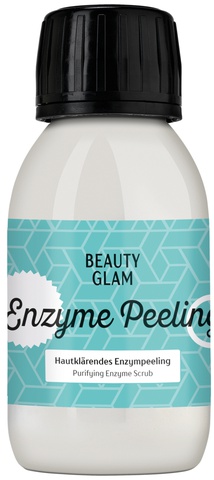
Ingredients overview
Highlights
Key Ingredients
Skim through
| Ingredient name | what-it-does | irr., com. | ID-Rating |
|---|---|---|---|
| Maris Sal | |||
| Disodium Lauryl Sulfosuccinate | surfactant/cleansing | ||
| Maltodextrin | |||
| Oryza Sativa Bran Powder | |||
| Aqua | solvent | ||
| Ananas Sativus Fruit Extract | soothing, moisturizer/humectant | goodie | |
| Lactobacillus Ferment | soothing, preservative | goodie | |
| Carica Papaya Fruit Ferment Extract | |||
| Raphanus Sativus Root Ferment Extract |
Beauty Glam Enzyme PeelingIngredients explained
A cleansing agent that's popular in "syndet bars" (soapless soaps) for its good foaming properties. It can also improve the mildness of famously aggressive, irritating surfactant, sodium lauryl sulfate (SLS).
It's a little helper ingredient coming from corn, rice or potato starch that can help to keep skin mat (absorbent), to stabilise emulsions, and to keep the product together (binding).

Good old water, aka H2O. The most common skincare ingredient of all. You can usually find it right in the very first spot of the ingredient list, meaning it’s the biggest thing out of all the stuff that makes up the product.
It’s mainly a solvent for ingredients that do not like to dissolve in oils but rather in water.
Once inside the skin, it hydrates, but not from the outside - putting pure water on the skin (hello long baths!) is drying.
One more thing: the water used in cosmetics is purified and deionized (it means that almost all of the mineral ions inside it is removed). Like this, the products can stay more stable over time.
A goodie fruit extract coming from the lovely pineapple. It contains a bunch of good-for-the-skin stuff: bromelain and fruit acids have mild exfoliant properties, and fruit sugars and amino acids give the pineapple fruit nice moisturizing and soothing properties.
There is also a pineapple extract called pineapple ceramide on the market that's claimed to be loaded with a glucose linked ceramide derivative called glucoceramide. According to the manufacturer, glucoceramide is not only a skin moisturizer but it also helps to lighten the skin and make it more smooth.
Lactobacillus ferment is an interesting probiotic ingredient with some promising properties.
First, according to a 2009 Estee Lauder patent, it’s a DNA repair enzyme and it can help to protect the skin against environmental aggressors.
Second, still according to Estee Lauder research but now from 2012 the ingredient has anti-microbial and anti-inflammatory properties and holds promise in the treatment of acne and rosacea. For the former one 5% was needed to show effectiveness, but for reducing skin sensitivity already 1% showed results.
The anti-acne effect is confirmed also by US manufacturer, Barnet, that says that Lactobacillus ferment is helpful in killing harmful bacteria and creating a healthy balanced microflora. Compared to well-known anti-acne and anti-inflammatory salicylic acid the probiotic worked faster at reducing the size and redness of acne lesions.
It also goes by the trade name Leucidal Liquid SF and can serve in the formula as a natural preservative.
Bottom line: It’s not the most proven ingredient (yet) but definitely a very promising one especially if you have sensitive skin, acne or rosacea.
This ingredient name is not according to the INCI-standard. :( What, why?!
This ingredient name is not according to the INCI-standard. :( What, why?!
You may also want to take a look at...
| what‑it‑does | surfactant/cleansing |
| what‑it‑does | solvent |
| what‑it‑does | soothing | moisturizer/humectant |
| what‑it‑does | soothing | preservative |





